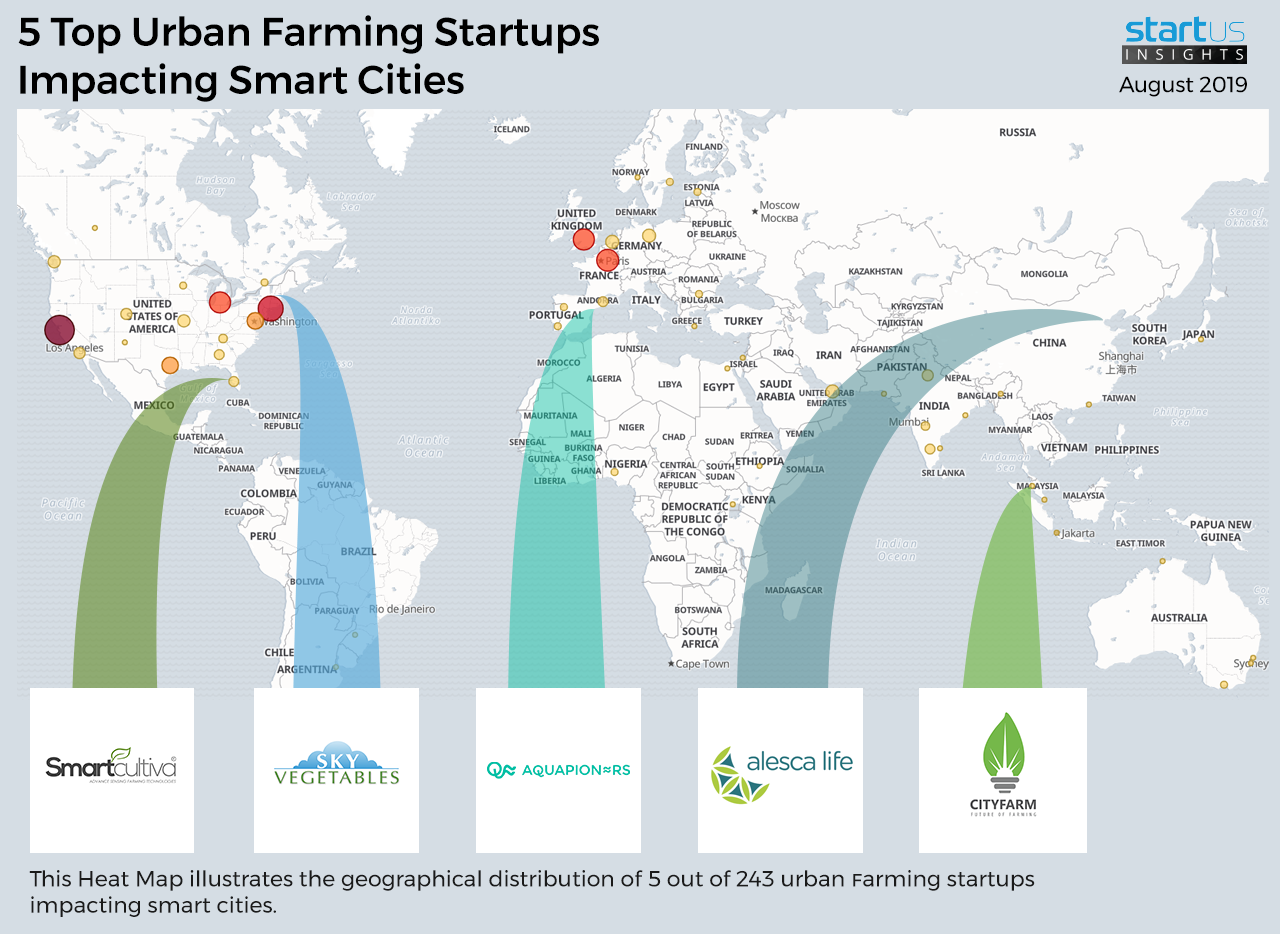Our Innovation Analysts recently looked into emerging technologies and up-and-coming startups working on solutions for Smart Cities. As there is a large number of startups working on a wide variety of solutions, we decided to share our insights with you. This time, we are taking a look at 5 promising Urban Farming startups.
Heat Map: 5 Top Urban Farming Startups
For our 5 top picks, we used a data-driven startup scouting approach to identify the most relevant solutions globally. The Global Startup Heat Map below highlights 5 interesting examples out of 243 relevant solutions. Depending on your specific needs, your top picks might look entirely different.
CityFarm – Vertical Farming
In all big cities today, there is a constant demand for greens and vegetables on the one hand and a gradual loss of arable land on the other. The integration of vertical farms into smart city buildings and infrastructure utilizes city space more productively and efficiently. Such farms also provide citizens with access to fresh produce without additional land usage while saving transportation. Malaysian startup CityFarm manufactures 4-level vertical farm modules, complete with artificial light for indoor installation. Their production capacity is around 115 kg of leafy greens, herbs, vegetables, and other specific fruits, with space for growing 768 to 1,024 plants.
Sky Vegetables – Rooftop Farming
Traditionally, rooftops accumulate heat from being exposed to direct sunlight. This heat radiates back into the environment, making urban areas warmer, creating pockets of urban heat islands. Rooftop gardening and farming can mitigate these issues by increasing a building’s natural insulation and thermoregulation, filtering pollution from the air while producing fresh food close to the end consumers. The USA-based startup Sky Vegetables develops and operates urban hydroponic rooftop farms, producing greens in greenhouses throughout the year. Their farm functions based on recycled rainwater irrigation in a recirculating system.
Alesca Life Technologies – Turnkey Freight Container Farming
As smart cities actively work to minimize distance and time between citizens and fresh produce, freight container farming creates many opportunities. A combination of smart urban farming, hydroponics, crop monitoring software, and (Light-Emitting Diode) LED lights allows citizens to densely pack plants and crops into freight containers. They bring food closer to consumers and eliminate transportation costs while decreasing land pollution. The Chinese startup Alesca Life Technologies produces mobile, modular, all-in-one turnkey freight container farming systems. Their solution includes remote environmental monitoring, automated dosing, and irrigation, as well as options for climate control.
Smartcultiva – IoT Based Smart Farming
Agricultural producers in cities have to track a lot of parameters on a daily basis to ensure a higher quality of crops. Internet of Things (IoT) sensors assist in mitigating this challenge by mining data about important farm factors such as soil, air, water, and climate for forecasting and analysis. Besides, IoT-based smart farming systems automatically adjust farm equipment to the changing conditions and allows for remote control. The USA-based startup Smartcultiva delivers a set of sensors, connected devices, and software for farm management. Their solution measures humidity, air, and water temperature, light intensity, carbon dioxide levels, and soil moisture before transferring this data to cloud-based IoT applications using various network protocols. The data is accessible on both mobile and web applications.
Aquapioneers – Urban Aquaponics
Urban aquaponics addresses land scarcity issues in smart cities by developing a smart water environment which combines fish farming through aquaculture and crop farming through hydroponics. Compact aquaponic farms, with a closed water loop, work to attain maximize the quantity and variety of food from a relatively small urban space to sustainably deliver vegetables and fish, without any operational water. Spanish startup Aquapioneers develops aquaculture kits, which transform a 54-liter aquarium into an aquaponic ecosystem to grow food all year round in households, offices, coworking spaces, schools, and hotels. Their kit is made of wood and has an open-source design.
What About The Other 238 Solutions?
While we believe data is key to creating insights it can be easy to be overwhelmed by it. Our ambition is to create a comprehensive overview and provide actionable innovation intelligence for your Proof of Concept (PoC), partnership, or investment targets. The 5 startups showcased above are promising examples out of 243 we analyzed for this article. To identify the most relevant solutions based on your specific criteria and collaboration strategy, get in touch.









